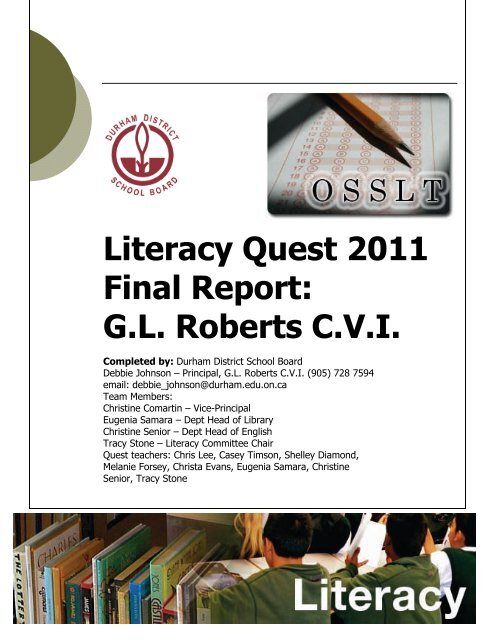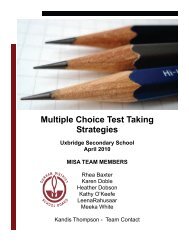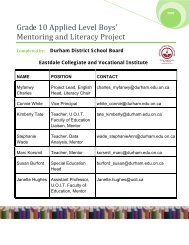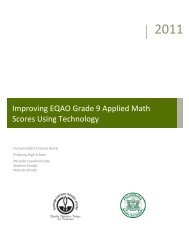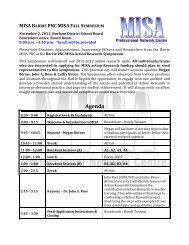Literacy Quest 2011 Final Report: G.L. Roberts C.V.I.
Literacy Quest 2011 Final Report: G.L. Roberts C.V.I.
Literacy Quest 2011 Final Report: G.L. Roberts C.V.I.
Create successful ePaper yourself
Turn your PDF publications into a flip-book with our unique Google optimized e-Paper software.
<strong>Literacy</strong> <strong>Quest</strong> <strong>2011</strong><strong>Final</strong> <strong>Report</strong>:G.L. <strong>Roberts</strong> C.V.I.Completed by: Durham District School BoardDebbie Johnson – Principal, G.L. <strong>Roberts</strong> C.V.I. (905) 728 7594email: debbie_johnson@durham.edu.on.caTeam Members:Christine Comartin – Vice-PrincipalEugenia Samara – Dept Head of LibraryChristine Senior – Dept Head of EnglishTracy Stone – <strong>Literacy</strong> Committee Chair<strong>Quest</strong> teachers: Chris Lee, Casey Timson, Shelley Diamond,Melanie Forsey, Christa Evans, Eugenia Samara, ChristineSenior, Tracy Stone
<strong>Literacy</strong> <strong>Quest</strong> <strong>2011</strong> <strong>Final</strong> <strong>Report</strong>: G.L. <strong>Roberts</strong> C.V.I.Completed by:Durham District School BoardDebbie Johnson – Principal, G.L. <strong>Roberts</strong> C.V.I. (905) 728 7594email: debbie_johnson@durham.edu.on.caTeam Members:Christine Comartin – Vice-PrincipalEugenia Samara – Dept Head of LibraryChristine Senior – Dept Head of EnglishTracy Stone – <strong>Literacy</strong> Committee Chair<strong>Quest</strong> teachers: Chris Lee, Casey Timson, Shelley Diamond,Melanie Forsey, Christa Evans, Eugenia Samara, ChristineSenior, Tracy StoneEssential <strong>Quest</strong>ions:1. Would direct feedback on literacy tasks delivered in small groups, focusing on Grade10, Level 2 Applied students, have an impact on their overall confidence and literacyskill development and subsequently, improve their success rates on the OSSLT and inthe English classroom?Background:1. We came to study this issue at G. L. <strong>Roberts</strong> C. V. I. due to a continued need toimprove the major skills needed to be successful on the OSSLT.2. The school has traditionally experienced a low level of achievement on the OSSLT,with the exception of a significant increase in April 2010.3. However, students who participated in <strong>Quest</strong> 2010 (previous year) experienced asignificant rise in achievement (78% versus 75% for the entire school), proving thatsmall group settings increased student confidence and subsequently results.4. Based on the significant increase of the 2010 O.S.S.L.T., and specifically the successfor the students who participated in the <strong>Quest</strong> 2010 program, we decided to look at anincrease in the <strong>Quest</strong> program to work with approximately fifty students.5. Students for this program were chosen by looking at who had achieved a level 2 orhigh level 1 on the Spring 2010 Grade 9 Practice Test. We also looked at the Fall<strong>Literacy</strong> Lessons to identify students requiring additional literacy support, and we
eceived direct feedback from teachers for each of our possible choices for theprogram. Lastly, we looked at all the new registrations to the school.6. We felt that mentoring students was important. Developing key relationships andtrust fostered a sense of community and a safe environment. In Deborah Berrill’sTutoring Adolescent Readers she states, “Tutors are in a unique position to buildtrusting relationships with their assigned students. Students come to rely on theirtutors, confide in them, and see them as people they can trust. In turn, tutors canbecome mentors who model good reading practices to their students” (Berrill et all 10).7. We decided that one of the eight groups would be a homogeneous group with onlymale students and a male teacher. The theory behind this was that the boys would bemore willing to participate in small group activities.8. The <strong>Quest</strong> lessons from 2010 were adapted and expanded focusing on four areas:reading strategies, writing pieces, short answer and conventions. These changes weremade after examining the EQAO data to identify trends/areas of weakness for ourstudent population.Data Collection Methods and Analysis:1. Our research project was carried out over the second semester of the school yearusing the following methods:1. October-December: After school <strong>Literacy</strong> Program2. January-March: After school <strong>Literacy</strong> Program3. January: Level 2 students selected based on the Practice <strong>Literacy</strong> Test written inthe spring of 2010, the Fall 2010 <strong>Literacy</strong> Lessons and staff recommendations.4. January - February: Completed logistics for the <strong>Quest</strong> program, including teachertimetabling and student permission forms.5. January: Updated lessons used in <strong>Quest</strong> 2010.6. February: Initial student questionnaire conducted.7. March: <strong>Literacy</strong> Spring Training conducted8. February – March: <strong>Quest</strong> Five lessons conducted.9. March: Post student questionnaire conducted.10. June: Analysis of EQAO results.
2. What <strong>Literacy</strong> <strong>Quest</strong>ion students readBy examining our surveys about what students are reading, we noticed that they firstly,wanted choices and secondly, enjoyed reading short, non-fiction material. This materialincludes: Web-based materials, magazines, and songs/poems.Types of Material <strong>Quest</strong> Students Read Outside of Class3025MagazinesWeb-based Material20Songs/PoemsNumber of Students 15NewspapersFiction105Non-fictionComicsLettersManualsReligious/Spiritual03. Data on Reading Frequency of <strong>Quest</strong> studentsIt is apparent that the students do not fully excel at reading skills due to the lack ofreading outside of school.
Reading Frequency of <strong>Quest</strong> Students Who Completed SurveysI read five hours or moreHow OftenI read more than three hours butless than five hoursI read more than one hour but lessthan three hoursI read one hour or lessI read only at school0 5 10 15 20 25 30# of Students4. Data on Writing Frequency of <strong>Quest</strong> students:It is apparent that our students do not fully excel at writing due to lack of writingoutside of school, other than texting and messaging.Writing Frequency of <strong>Quest</strong> Students Who Completed SurveysI write five hours or moreHow OftenI write more than three hours butless than five hoursI write more than one hour but lessthen three hoursI write one hour or lessI write only at school0 2 4 6 8 10 12 14 16 18 20# of Students
Results and Findings1. General attendance (89% attendance)There were 47 students initially invited to be involved in the <strong>Quest</strong> sessions. Ourschool has a very transient population. One student did not complete the sessionsdue to parental choice and concern that the student would be missing too much ofclass instruction time. A second student moved from our school. A third studentopted to take the after school literacy course instead. Therefore, the data from 44students will be discussed.Attendance SummaryGroup A(5 students)Group B(6 students)Group C(6 students)Group D(4 students)Group E(5 students)Group F(6 students)Group G(6 students)Group H(6 students)Total(44 students)TotalPercentageper sessionSession 1 Session 2 Session 3 Session 4 Session 54 5 4 3 26 6 6 5 46 4 6 5 43 2 3 2 24 4 5 4 56 + 1 5 +1 6 6 66 6 6 5 66 5 +2 4 5 442 40 40 35 3995% 91% 91% 80% 89%Extenuating Circumstances+1, indicates that students who had scheduling conflicts (tests, field trips,etc.) were accommodated into alternate group sessions so that materialwas not missed.Session 4 was the Wednesday/Thursday before March BreakOn two separate sessions (3 & 5) students were absent due to science labwork in their regularly scheduled class.
2. Participation in School <strong>Literacy</strong> ActivitiesIn our Post-<strong>Quest</strong> survey, 73% of the students had attended our Spring Trainingsessions. Spring Training involves active literacy activities directly related to the test.Eighteen percent attended the after-school literacy program.Participation in <strong>Literacy</strong> Activities by <strong>Quest</strong> Students Who Completed Post Survey45Grade 9 Practice Test<strong>Quest</strong> Tutoring40In-class Lessons3530Number of Students2520Spring Training15105After School ProgramRemedial Sessions03. Confidence LevelOur <strong>Quest</strong> students went into the test feeling confident in their abilities. In the Presurvey,50% of the students felt less than confident that they would be successfulon the test. In the Post-survey, only 21% felt less than confident that they wouldbe successful on the test. In the Pre-survey, 25% felt somewhat confident that theywould be successful while in the Post-survey, 12% felt somewhat confident. Thepercentage of the very confident students in the Pre-survey was 22% as opposed to67% in the Post-survey. Clearly, the students felt that these small group sessionshad helped them to prepare for the test.
4. OSSLT ResultsOur FTE school results were 63% successful.Whole School Success Rate for First Time Writers of the <strong>2011</strong> O.S.S.L.T.Unsuccessful37%Successful63%Our <strong>Quest</strong> <strong>2011</strong> group results were 63% successful.Success Rate for <strong>Quest</strong> Participants on the <strong>2011</strong> O.S.S.L.T.Unsuccessful37%Successful63%
5. Anecdotal Survey SummaryStudent opinions about the <strong>Quest</strong> Program were overall positive. The majorityfound the program to be very useful in preparing them for the O.S.S.L.T. Studentswere very grateful for the opportunities, and felt that they were better prepared forthe test.One student wrote, “I have a better understanding of how to write a news reportand the supported opinion, and I was able to ask questions in my small <strong>Quest</strong>group”.Another student wrote. “It is very useful because it helps us prepare for theupcoming test. It is also useful because it takes us toward success”.One of the drawbacks of the <strong>Quest</strong> format is that students miss time in their classes.This was pointed out by several students in their written evaluation of <strong>Quest</strong>.Regardless of this, students felt that they had made a connection to their mentorand connections with other students in this small group setting.6a. ConclusionsOur <strong>Quest</strong> group sample students need the opportunity to see adults, specificallyteachers, model good reading practices since this is their main exposure to reading.Students rarely read outside of class.Students need more practice with improving their background knowledge. This needsto be a cross-curricular effort beginning in grade nine.6b. Next StepsLooking at our findings from this project and the O.S.S.L.T. results, we need to begin<strong>Quest</strong> earlier in the year and run it for more than five sessions.We believe that it is worthwhile to continue to with these small group mentoringsessions with the structure slightly altered. This would entail using the mentors, butrotating through the key topics. In this way, students would not miss the same classon a consistent basis. Each mentor would be an expert on a particular key topic. Thestudents would come away with multiple connections to teacher-mentors.
We also believe that we need to begin these <strong>Quest</strong> mentoring sessions in grade nine,the expectations that the students reach a level 3 in the supported opinion and newsreport writing by the end of grade nine.
Budget:We had applied for $7,244 and received $3,568Item Description ProjectedCostActual CostSupply(pre)2 x ½ days x 8 teachers-training of new members to group-adapting and expanding of literacy lessons$1,784.00Changed to 1day$892Supply(during)Supply(post)6 weeks x full day x 2 groups-meeting with students-literacy lessons2 x ½ days x 8 teachers- analysis of OSSLT results and review oflessons$2,676.00Changed to 5days$2,230$1,784.00 Changed to 1day for 4teachersBooksSelection of White Pine, Manga, GraphicNovels50 copies x $20.00$446$1,000.00 Did notpurchaseTOTAL $7,244.00 $3568.00
Reflections and Action:1. Review lessons and identify teacher-mentors for key lessons.2. Alter existing lessons to provide two periods for each of the key topics.3. Meet with the EQAO Board Representative to identify areas of weaknessfor students.Contributions to MISA Professional Network Centre:We hope that our <strong>Literacy</strong> <strong>Quest</strong> <strong>2011</strong> project for Grade 10 students and results canassist other D.D.S.B. secondary schools in improving their O.S.S.L.T. success rates. Wealso hope to learn from other MISA initiatives in the future.Suggestions for Future Research:We would welcome the opportunity to continue this project next year in <strong>2011</strong>-2012, tofurther increase the confidence levels and O.S.S.L.T. performance levels of our Grade10 student population.
Appendices
Appendix A1<strong>Quest</strong> ScheduleGroup 1 Group 2 Group 3 Group 4 Group 5 Group 6 Group 7 Group 8Timson Diamond Evans Lee Samara Stone Senior ForseyFeb 16 PD1Feb 23 PD2MAR 9PD 2MAR 23PD 1MAR 29PD 2Feb 16 PD1Feb 23 PD2MAR 9 PD2MAR 23PD 1MAR 29PD 2Feb 16PD 2Feb 23PD 1MAR 9PD 1MAR23 PD 2MAR29 PD 1Feb 16PD 4Feb 23PD 3MAR 9PD 3MAR23 PD 4MAR29 PD 3Feb 17PD 1Feb 24PD 2MAR10 PD 2MAR24 PD 1MAR30 PD 2Feb 17PD 2Feb 24PD 1MAR10 PD 1MAR24 PD 2MAR30 PD 1Feb 17PD 3Feb 24PD 4MAR10 PD 4MAR24 PD 3MAR30 PD 4Feb 17PD 4Feb 24PD 3MAR10 PD 3MAR24 PD 4MAR30 PD 3
Appendix A2<strong>Literacy</strong> <strong>Quest</strong> <strong>2011</strong>SMART goal (from Hume’s The Evidence-Based School)S-SpecificM-MeasurableA-AchievableR-Results BasedT-Time-BoundS-What needs to be achieved?M-How will we measure achievementA-Goals should be challenging, but notimpossible, to achieveR-successful achievement of the goalshould make a difference to studentachievementT-time frames should be attached tothe goal so there is enough time forachievement, but not so much timethat energy and effort diminishAssist 50 students in a smaller setting withpreparation for the OSSLT1) Survey of knowledge/attitude: pre &post2)Practice OSSLT previously done (2010)3)Practice OSSLT done in 20104) OSSLT80% to succeedstrategies to apply to the 1P1/2P1 classJanuary-students selected; materialscollected and lesson writing; contactstudentsFebruary-lesson writing continued-meet with studentsLesson dates: Feb. 16,17, 23,24,March 9,10, 23, 24, 29, 30
Appendix BG.L. <strong>Roberts</strong> C.V.I.399 Chaleur Ave.Oshawa, ONJanuary 11, <strong>2011</strong>Dear Parent/Guardian,Your son/daughter has been recommended to take part in a free literacy tutoring program <strong>Literacy</strong> <strong>Quest</strong> <strong>2011</strong>, conducted by G.L. <strong>Roberts</strong>’ English teachers. Your child will write the Ontario Secondary School <strong>Literacy</strong> Test (OSSLT) on March 31, <strong>2011</strong>.These teachers will be providing small group tutoring based on the reading and writing tasks required to be successful on theOntario Secondary School <strong>Literacy</strong> Test (OSSLT). Tutoring will be individualized to student needs. All teachers will workunder the direction of the Vice Principal, Ms. Comartin.The tutoring will run from February <strong>2011</strong> through April <strong>2011</strong>. Your child will be withdrawn from class once a week for smallgroup tutoring during regular school hours for 75 minutes each.If you are in agreement with having your child take part in this tutoring program, please sign this consent form and return it byFebruary 11, <strong>2011</strong> to E. Samara in the library.If you have any questions, please call or get in touch with E. Samara at 905-728-7594 ext. 221.We look forward to helping your child succeed.Sincerely,E. Samara C. Senior C. Lee C. TimsonHead of Library Head of English Special Education Teacher Student Success TeacherT. Stone M. Forsey C. Evans S. Diamond<strong>Literacy</strong> Chair English Teacher English Teacher English Teacher______________________________________________________________________________Please return this portionStudent Name: ____________________________I agree to allow my child to take part in the tutoring program <strong>Literacy</strong> <strong>Quest</strong> <strong>2011</strong>.I do not agree to allow my child to take part in the tutoring program <strong>Literacy</strong> <strong>Quest</strong> <strong>2011</strong>._______________________ _________________________ _______________Parent/Guardian Name Parent/Guardian Signature DatePrint
Appendix C<strong>Literacy</strong> <strong>Quest</strong> <strong>2011</strong>MISA InitiativeJanuary <strong>2011</strong>-March <strong>2011</strong>LESSON DATE TOPICS RESOURCES / MATERIALS1 IntroductionWhy are we here? (Three keyquestions on chart paper)What do you know about theOSSLT? (Pre-survey)Grammar: Homonyms (doesthis belong?)OSSLT: Multiple ChoiceMultiple Choice ChecklistEnglish Essentials: CanadianEd. Pg. 233-236Chart Paper / MarkersPre-surveyM/C Checklist“Olympics” & “Aliens” articlesplus questionsModel together: “Olympics”Individual: “Aliens”Mark and review answers iftime2 Mark and review M/C ifneededGrammar: Quotation MarksOSSLT: News <strong>Report</strong>Review pyramid and analyzesample report + rubricModel together: “Pet PigSaves the Day”English Essentials: CanadianEd. Pg. 199-202Pyramid handoutSample reportRubricNews <strong>Report</strong> TemplatesIndividual: “Real LifeSuperman Exists” (hand in)
3 Hand back news report -review key concepts andcommon errorsGrammar: Punctuation:CommasOSSLT: SummarizingOverview of summarizinghandoutReading selections:1) Dialogue - SCOPE - January11, 2010 p. 62) Info paragraph - SCOPE -December 14, 2009 p. 14-153) New <strong>Report</strong> - “Just callhim Stinky Pants”4) Real life Narration -ACTION - September 21, 2009p. 12-1550 Graphic Selection - Trent-Severn Waterway BrochureEnglish Essentials: CanadianEd. Pg. 180-182Scholastic magazines - SCOPE& ACTIONIndividual summary templates(small squares)Placemat sheetGlue / scissorsSummary writing templateActivity: Placemat - Whilereading, write down 3 keypoints from selection ontemplate (square) - Glue toplacemat - Discuss eachselection (features) - how tofind key pointsWrite summary of selection(hand in)
4 Hand back summaries -review key concepts andcommon errorsGrammar: Subject-verb agr.OSSLT: Opinion PieceEnglish Essentials: CanadianEd. Pg. 127-129Exemplars + rubricsOpinion piece templatesReview exemplars + EQAOrubric for opinion piece -“Is it a good idea for highschool students to have apart-time job?” discussstructureModel together:“Is a four day school week agood idea?”brainstorming + introduction+ first body paragraphIndividual: finish second &third body paragraphs +conclusionCHOICE OF TOPICS:Security Cameras in SchoolsDoes being social onlinemake you anti-social in life?(hand in)
5 Hand back opinion piece -review key concepts andcommon errorsGrammar: SentenceFragmentsOSSLT: Short Writing TaskHandoutEnglish Essentials: CanadianEd. Pg. 132-133Exemplar + rubricOpen Response TemplateSurveysReview exemplar + rubric“If you could learn how to dosomething new, what wouldit be and why?”Individual: Open Response<strong>Quest</strong>ion“What is your favouritemovie?”<strong>Quest</strong>ions about OSSLTSurveya) What is your opinion of the<strong>Literacy</strong> <strong>Quest</strong> <strong>2011</strong> tutoringsessions?b) M/C Post surveyWrap up
Appendix DStudent Initials: _________<strong>Literacy</strong> <strong>Quest</strong> <strong>2011</strong> InitiativeThe Ontario Secondary School <strong>Literacy</strong> Test: Student Post <strong>Quest</strong>ionnairePlease answer the following questions. This is a survey only; this does not count towards agrade. Your answers will remain anonymous.1. When will you write the O.S.S.L.T.?June <strong>2011</strong>March <strong>2011</strong>April <strong>2011</strong>What literacy test?2. On a scale of 1(not very confident)-10 (very confident) how confident do you feel aboutwriting the literacy test?❶ ❷ ❸ ❹ ❺ ❻ ❼ ❽ ❾ ❿Not very confident confident Very confident3. Which of the following school literacy activities have you done to prepare for the O.S.S.L.T.?May 2010, Grade 9 <strong>Literacy</strong> Practice TestOctober 2010, In class <strong>Literacy</strong> LessonsNovember & December 2010, the After School <strong>Literacy</strong> Program4. What types of major writing assignments are on the test? Select all that apply.News <strong>Report</strong>Business LetterEssaySupported Opinion PieceResumeSummaryOpen Ended ResponseS.E.E.C. paragraph
5. What types of questions will be on the test? Select all that apply.Multiple ChoiceShort AnswerLong AnswerTrue/FalseMatching5. What types of reading selections will be on the test? Select all that apply.DialogueNews <strong>Report</strong>sReal life narrativeFictionNon-fictionGraphic SelectionsInformation Paragraphs6. How often do you read during a typical week?I read only at school.I read one hour or less.I read more than one hour but less than three hours.I read more than three hours but less than five hours.I read five hours or more.7. What types of material, not including homework, do you read? Select all that apply.Non-fiction books, (biographies)ComicsWeb sites, e-mail, chat messages, blogsLettersMagazinesManuals, InstructionsNewspapersNovels, fiction, short storiesSong lyrics, poemsReligious or spiritual writings
8. Indicate how often you use a computer at home for homework (choose one only).I don’t have a computer at homeI never or hardly ever use the computer for homework.I use the computer once or twice a month for homework.I use the computer once or twice a week for homework.I use the computer almost every day for homework.9. How often do you write during a typical week?I write only at school.I write one hour or less.I write more than one hour but less than three hours.I write more than three hours but less than five hours.I write five hours or more.10. What types of writing you do, not including school work, in a typical week? Select all thatapply.E-mail, chat messages, blogsLetters, journals, diariesNotes, directions, instructionsSong lyrics, poemsStories, fictionWork-related writing11. How have you prepared for the test?I read over my school notes.I visited the EQAO website.I attended the after school literacy class.I will not prepare for the test.I attended the <strong>Literacy</strong> <strong>Quest</strong> tutoring sessions.I attended Re-mediation sessions in the library.I attended Spring Training in the library.<strong>Quest</strong>ions 6-10 adapted from www.eqao.com O.S.S.L.T. Section M: <strong>Quest</strong>ionnaire.


